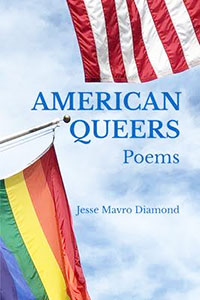 *
*
The Cervena Barva Press of Somerville has released a new collection of poetry American Queers by Jesse Diamond. Poet Judson Evans writes of this book:
“In AMERICAN QUEERS: Poems Celebrating Mid-Century Gay Activists, Jesse Mavro Diamond imagines a metaphoric kingdom inhabited by four relatively unknown gay and lesbian royal champions. With sharp wit and whole-hearted empathy, the poet extols and elegizes Stormé Delarverie, Richard Leitsch, Pat Parker and Charley Shively. Appending the poems with well researched biographical notes on each activist, diverse readers, students and teachers will discover the work is compelling and informative. AMERICAN QUEERS “impresses with historical vision and authenticity.”
I recently caught up with Diamond to conduct an interview for The Somerville Times.
Doug Holder: What gave you the impetus to write this poetry book at this time in your life?
Jesse Mavro Diamond: I’ll turn 75 next year. At this point in my life, it was a priority to count my blessings for those great gay leaders who preceded me. As a retired teacher, I wanted to continue teaching the next queer generation, and, hopefully, the one after that, to count their blessings.
DH: Your poetry collection salutes the leaders of the Gay Rights Movement. This includes Charlie Shively, Storme’ De LaVarverie, Richard Leitsch, and Pat Parker. I had the pleasure to meet Charles Shively at Stone Soup Poets in Cambridge, MA, but the other folks I am not familiar with. Can you talk a bit about them, and why you chose them for your collection?
JMD: All four of these remarkable people defined the word courageous.
Several decades ago, Charlie Shively and I taught in The Law and Justice Program at UMass Boston. I loved him fiercely because he was a brilliant historian with an impudent, intrepid approach to battling the world of gay oppression.
Pat Parker, a Black lesbian feminist, had my admiration for slaying racist, homophobic haters with her sharp tongue. Dying at 45 from cancer, she’d already contributed building the Canon of lesbian poetry.
I wanted to research Dick Leitsch and learn about him as a movement radical. Spinning off the Civil Rights Movement’s Sit-Ins, he and a few others created the Sip-In Movement. Gays were legally spoken of as “disorderly”; litigation attempted to shut us off from the choice of drinking in bars we chose to frequent. He helped change that.
Handsome, much younger looking than her age and a crooner in the style of Frank Sinatra, Stormé DeLarverie carried a gun and roamed the streets of the Village to protect other lesbians. She was fearless and ready to do whatever was needed to stop “the Uglies” as she called them from threatening and attacking her beloved sisters. Did she throw the fist punch at Stonewall? She said she did and I believe her.
DH: You have a section of the book that deals with the Stonewall Riots, the famous gay bar that was raided by the New York City police, and the riot that ensued as a result. And in fact, the Stonewall was aptly named as sort of a metaphor for the stonewall that the gay community faced. Can you talk a bit about the bar, and were you a regular patron?
JMD: I wish I had been able to patronize it. Stonewall was just a bit before my time; I only knew of the bar after the Uprising. The poem Stone wall expresses that metaphor:
Stone wall
(n.)A structure of stone
built up to enclose, divide,
support or protect.
Usage:
1.Take a polaroid
of that gorgeous queen in front
of the crumbling stonewall.
2.Rip a brick from that
crumbling stone wall and
use it to defend yourself.
3.Old Stonewall… tumbling down
Tumbling… tumbling down
Old … Wall…
DH: Was writing this collection of poetry cathartic for you?
JMD: Yes and no. I did need to express the painful truths about my life and the lives of other women and men wounded by the battle we fought against ignorance. I came out in June 1970, at 21, the year of the first Gay Pride Parade. I had just recovered from an emotional breakdown and being released from a hospital. Recalling events that occurred then stimulated the memory of remarkable joy our community experienced at that time.
DH: Why should we read your book?
JMD: My hope is the poems will educate readers, especially younger readers, about the inspiring leadership of these queer, heroic American women and men. Our time, as has so often been said, represents the terrible polarization between truth and lies, love and hate, courage and cowardice. Those who believe in the indefatigable power of Love will find a balm in these poems for the wounds they suffered battling against ignorance and hate.















Reader Comments